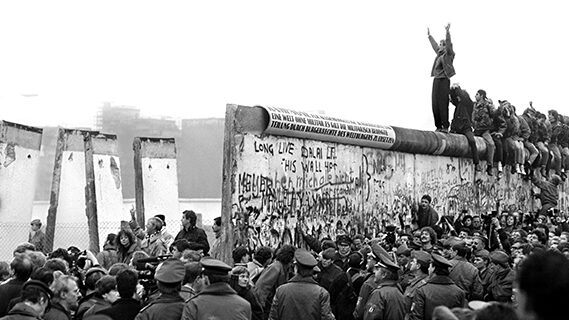Chapter – 1
End of Bipolarity
Overview
This chapter deals with the study of Post World War II era that was concerned with formation and disintegration of certain economic and military alliances. Here we will discuss Post world war II conditions of Soviet Union, its problems and disintegration. Precisely we look into following topics:
- Formation of USSR
- Soviet System
- Merits and Demerits of Soviet System
- Fall of Berlin wall
- Mikhail Gorbachev and Soviet Union
- Causes of disintegration of USSR
- Consequences of Disintegration of USSR
- Shock Therapy
- Consequences of Shock Therapy
- Post Soviet Economies
- Tensions and conflicts Balkans and Central Asian Countries
- India and Russia Bilateral agreement

- Fall of Berlin wall established a landmark in political history.
- It paved the way for German Economic and political unification in October 1990.
- The wall which had been established in year 1961 at the peak of cold war, dividing Berlin in to Communist and Capitalist block, was breached and Iron curtail was collapsed.
- Impact: End of Cold War
- German Reunification
- Democratic movements
How was USSR formed?
- USSR (Union of Soviet Socialist Republics) was the resultant of Russian Revolution of 1917.
- It was officially established on December 30, 1922 including four republics Russia, Ukraine, Belarus and Transcaucasian federation.
What was Soviet System?
- Soviet System was based on the concept of Socialism primarily based on the creation of egalitarian society.
- The Soviet system gave privacy to the state and the Institution of the party .
- The political system centred around the Communist Party no other political or opposition party was allowed .
- The economy was planned and controlled by the state.
- The Soviet economy was more developed than the rest of the world except for the US.
- It had a modern and complex communication network having energy resources including oil, iron steel, machinery, production and transport sector that connected its remotest area with efficiency.
- Its domestic industry was well developed .
- The Soviet state insured minimum standard of living for all its citizens,
- The government subsidize basic necessities including health, education child care and welfare schemes for its citizens.
- There was no unemployment .
- State ownership was the dominant form of ownership land and productive ,assets were controlled by the state.
- There was no private property and the society was based on the principles of equality.
Merits of Soviet System
- Public control of assets and resources ensured easy accessibility and equitable distribution of resources.
- Full employment .
- Everybody was ensured minimum living standard.
- Essential commodities were provided on highly subsidised prices.
Demerits of Soviet System
- The Soviet system, however, became very bureaucratic and authoritarian, making life very difficult for its citizens.
- Lack of democracy and the absence of freedom of speech stifled people who often expressed their dissent in jokes and cartoons.
- The Communist Party of the Soviet Union had tight control over all institutions and was unaccountable to the people.
- The party refused to recognise the urge of people in the fifteen different republics that formed the Soviet Union to manage their own affairs.
What were the major reasons that alienated commons away to Soviet System?
- The Communist Party refused to recognise the urge of people in the fifteen different republics that formed the Soviet Union to manage their own affairs including their cultural affairs.
- Although, on paper, Russia was only one of the fifteen republics that together constituted the USSR, in reality Russia dominated everything.
- People from other regions felt neglected and often suppressed.
- In the arms race, the Soviet Union managed to match the US from time to time, but at great cost.
- The Soviet Union lagged behind the West in technology, infrastructure (e.g., transport, power), and most importantly, in fulfilling the political or economic aspirations of citizens.
